Advice on Finding the Best Detox Treatment for You
Just like there are many types of addiction, there are many detox options offered at alcohol and drug detox treatment centers. If you are seeking help with your own addiction, the first thing you need to do to find the best detox treatment for you is to learn what kinds of detox services are available, and which of them best match up to your individual situation. Factors to consider include your primary drug of use, the severity of your addiction, the duration of your addiction, your location and/or willingness to travel, and your personal preferences.
Completing a successful detox cleanses your body of toxic substances so that you can begin to heal physically, mentally, and spiritually. It is only the first step of addiction recovery, but it is an essential step. Getting past physical withdrawal will allow for a clearer frame of mind, with improved health and energy, which will put you in a better place to experience the benefits of a comprehensive treatment program, which should include psychological counseling and behavioral therapy.
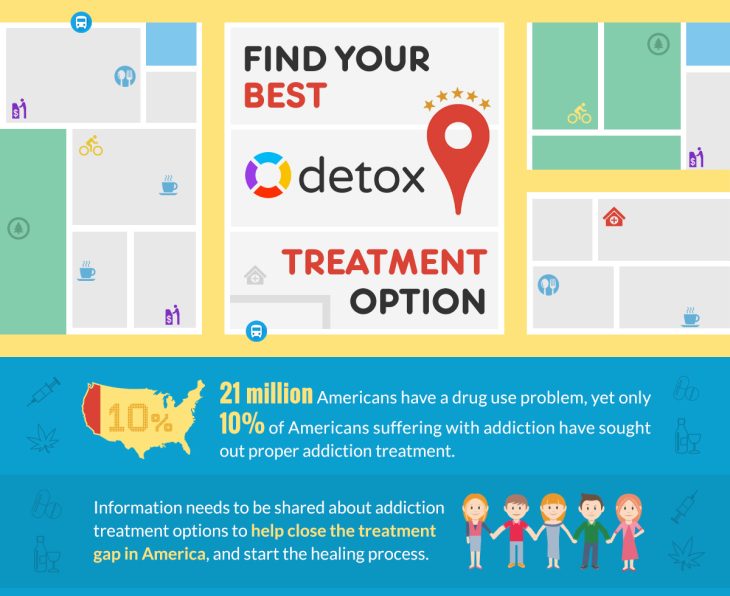
The Detox Treatment Gap in the United States
Approximately 27 million Americans over the age of twelve are current or recent users of illicit drugs.
Marijuana ranks as the most commonly used drug, followed by the misuse or illicit use of prescription drugs.
This same survey found that approximately 5 ½ million young adults age 18 to 25 (15.5% of total population) need substance use disorder treatment, as do 15 million adults age 26 and up (7.2% of total population). However, the United States is facing a deplorable treatment gap when it comes to substance use disorders—specifically, 89.2% of people who need addiction treatment do not receive it.
Choosing Your Detox Treatment
Successful treatment for substance use disorder has several steps: detoxification, medication (addiction medications, antidepressants, etc.), counseling, diagnosis and treatment of any co-occurring mental health disorders such as anxiety, and aftercare to prevent relapse.
The first step to addiction recovery—detoxification—is the process of managing drug and alcohol withdrawal symptoms while helping the body rid itself of addictive substances. It is not a cure for addiction, but should be seen as one small, though crucial, part of a comprehensive treatment program that addresses the physical, psychological, and behavioral sides of addiction. Recovery from addiction isn’t something that you can accomplish quickly, then be done with. Recovery is the process of building a newer, stronger, healthier life that makes it easier and easier to resist the temptation to use addictive substances.
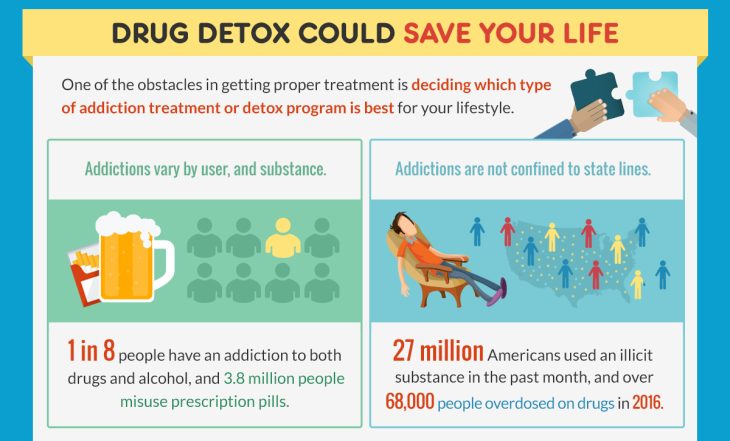
No matter what kind of detox program you choose, treatments to manage your withdrawal symptoms will be key. Withdrawal symptoms begin as your primary drug of use starts to wane in your system, usually within hours. These symptoms continue for days, weeks, or longer, depending upon the substance in question, the degree of addiction, and the individual’s health and body chemistry, although the worst of the symptoms usually pass in one to two weeks. These symptoms—such as depression, insomnia, physical pain, vomiting, anxiety, tremors, and more—are so unpleasant, that anyone attempting to detox themselves without help will most likely return to substance use to find relief.
The risk of relapse is one of the reasons why checking into a drug detox treatment center to receive professional detox services is a much better choice than a DIY home detox. Another, more important reason to seek professional detox services is that some withdrawal symptoms are dangerous, or can lead to dangerous health complications. Without prompt emergency treatment, some of these complications can be fatal. Having some sort of professional supervision during your detox is very important to your health and wellbeing, not to mention your recovery success.
Medical Detox
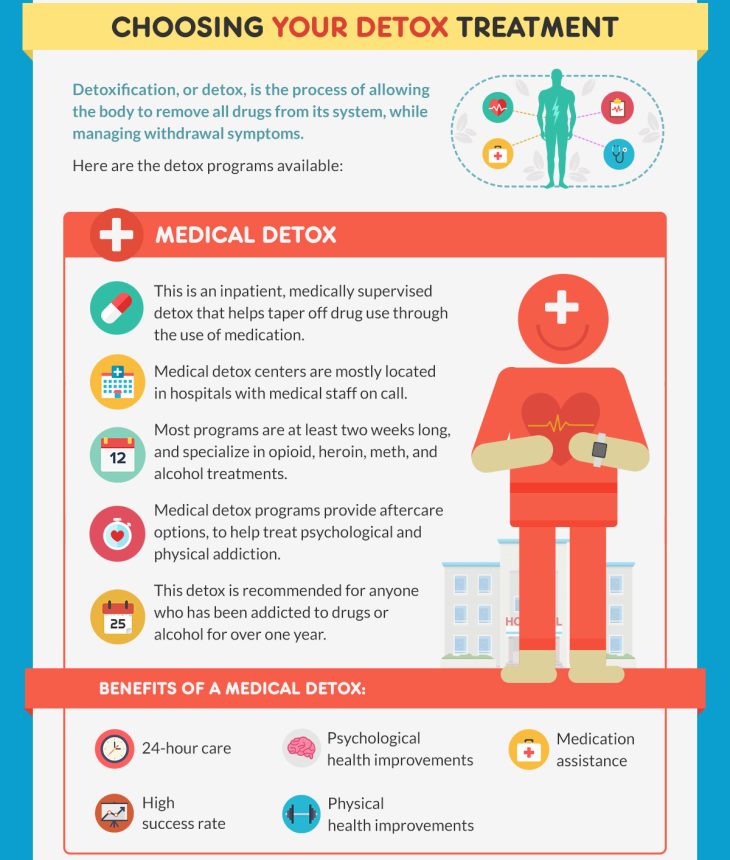
Medical Detox is an inpatient, medically-supervised form of detox that helps you through the unpleasant withdrawal process using medications. Medications such as buprenorphine or methadone for opiate addictions, or Acamprosate or disulfiram for alcohol addictions, counteract physical withdrawal, keeping you as safe and comfortable as possible throughout detoxification. Medical detox is recommended for anyone who has been addicted to alcohol or drugs for a year or longer, because the physical dependence in these cases is more entrenched.
Most medical detox centers are located in hospitals with medical monitoring and medical staff on call at all times, meaning any issues that arise through the process of detoxification will be dealt with promptly and professionally. These centers also tend to provide counseling services and access to peer support groups, so that patients can start to deal with the psychological, behavioral, and social sides of their addiction while they are undergoing medical treatment for the physical side.
Contact Detox.com now to find medical detox programs near you!
Most Medical Detox programs last for at least two weeks, and usually specialize in opioid, heroin, meth, and alcohol detox services. Some patients transition from a medical detox into an inpatient or residential program where they live at the treatment facility, and some transition into an outpatient program that allows them to return to their homes to sleep. Whichever you choose, you need to continue receiving treatment without interruption, so you don’t lose any of your progress after detox. These programs should provide aftercare options for after discharge as well, such as referrals to counseling and community services to ensure that you continue your recovery from the physical and psychological sides of addiction.
- 24-hour medical care
- High success rate
- Medication assistance in case of health complications
- Physical health improvements
- Psychological health improvements
Natural Detox
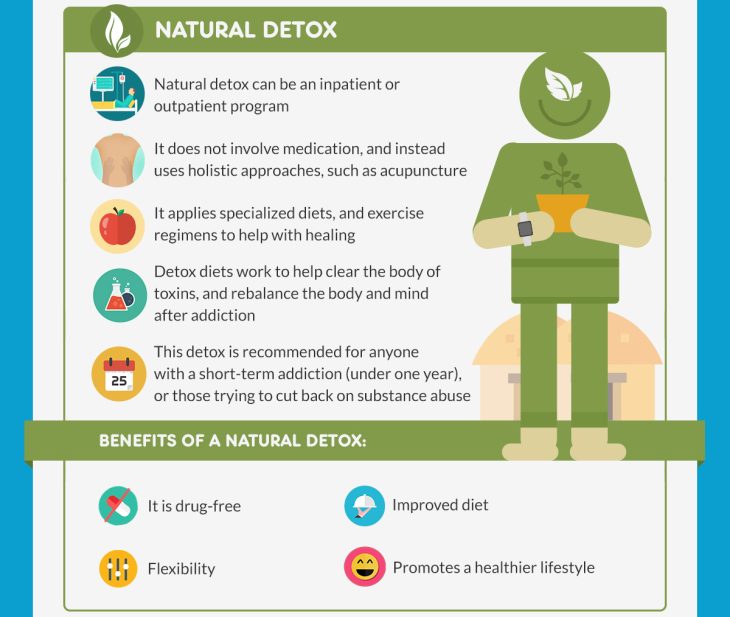
If you are only trying to cut back on problem drinking or drug use, need treatment for chemical dependency rather than addiction, or have a short-term addiction (meaning you’ve been using for less than a year), you may choose to try a natural drug or alcohol detox.
Natural detox can be through an inpatient or outpatient program. What makes them “natural,” is that they use non-medical, holistic approaches to treat withdrawal symptoms. Some of these holistic detox services include acupuncture, massage, and vitamin and mineral supplements, as well as therapies such as mindfulness training, equine therapy, art and music therapy, and recreational therapy. Although these treatments can be a big help to patients suffering the unpleasant symptoms of withdrawal, they are not exclusive to natural drug detox treatment centers. Many facilities that provide medical detox also offer holistic options as part of treatment.
A natural detox can help you overcome drug dependence. Get the treatment you need today!
Natural drug detox treatment centers tend to focus on exercise regimens, and specialized diets that include lots of fresh, whole, unprocessed foods to help cleanse the body and facilitate healing. Improving physical health throughout detox can help rebalance a body and mind that have become dependent upon addictive substances. Exercise can be particularly helpful, as it works to bring up levels of endorphins, dopamine, and other neurotransmitters that have been depleted by regular drug and alcohol use. Whether a patient is undergoing natural or medical detox, good nutrition and exercise will be a great help to their progress throughout the recovery journey.
Benefits of a natural detox:
- Drug-free
- Improved diet
- No need for daily medication dispensing, making it flexible
- Focus on holistic treatments
- Promotes a healthier lifestyle
Rapid Detox
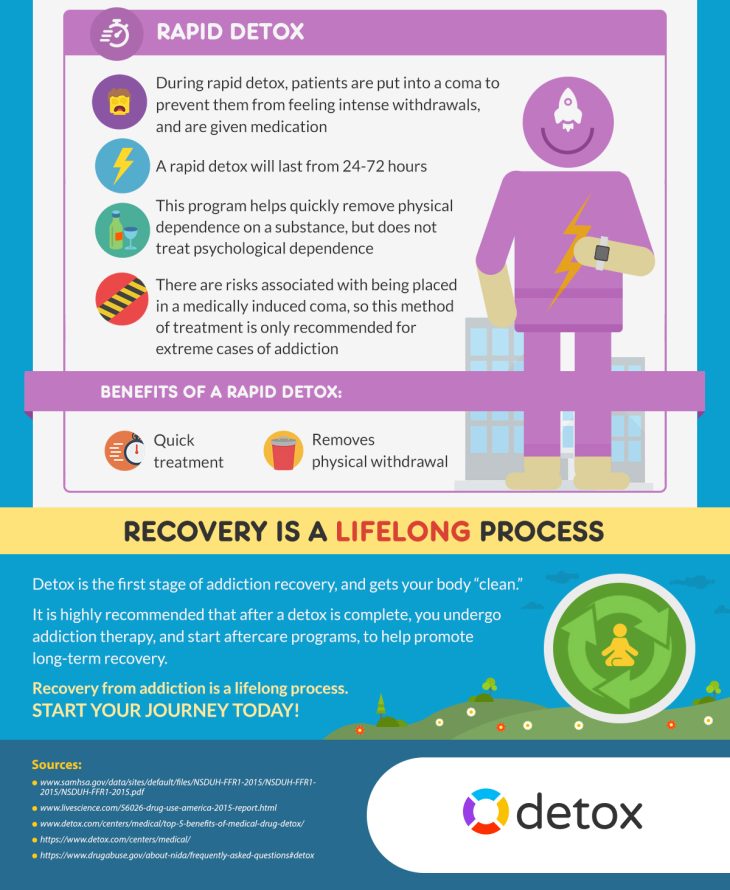
For patients addicted to opiates like heroin or prescription narcotics, rapid detox may be an option. A patient undergoing rapid detox is put into a medically induced coma, and is given medications to speed up their body’s metabolism of opiates, so that the drugs are more quickly flushed from the system. In once daily sessions over the course of a few days, the patient is meant to be freed from physical dependence on opiates, without having to suffer the acute symptoms of withdrawal. Results can vary, however, as individual response to medications, and individual withdrawal experiences tend to vary from person to person.
Benefits of a rapid detox:
- Quick detox treatment
- Removes most symptoms of physical withdrawal
This method of detox is only recommended in extreme cases of addiction. There are health risks associated with medically-induced comas due to reactions individuals may have to the anesthesia used to put them under. Patients will also still wake up to psychological symptoms and cravings, as well as some physical symptoms related to their damaged opiate receptor system. Repairing this damage and replenishing and balancing the levels of necessary neurotransmitters in the brain will take much longer than just a few days, so patients should expect to encounter some withdrawal symptoms, even after treatment.
Like all forms of detox, rapid detox should only be used as a single component of a full treatment program. Because rapid detox is such a quick experience, patients are likely to feel less secure in their sobriety afterwards than if they went through a slower, two-week detox that included other recovery support services, such as counseling and peer support groups.
Ultra-Rapid Detox
The difference between rapid detox and ultra-rapid detox is how long it takes to complete.
Ultra-rapid detox takes only one day, instead of several days, which necessitates putting the individual under much deeper anesthesia for a much longer period of time while the opiates are removed from their system.
The appeal of being able to drift off to sleep and then wake up a few hours later free from physical dependence is undeniable, but the risks of this kind of detox are considerable. Ultra-rapid detox leads to more frequent negative reactions to anesthesia than rapid detox, creating issues such as seizures, worsening of mental health issues, diabetes complications, cardiac irregularities and cardiac arrest, fluid in the lungs, and other breathing problems. Another drawback is that ultra-rapid detox is only effective for individuals with mild to moderate drug dependencies.
Individuals with pre-existing conditions such as blood sugar issues, AIDS, heart disease, hepatitis, previous pneumonias, or certain psychiatric disorders such as bi-polar disorder, are at greater risk of suffering anesthesia related complications, and should not be considered viable candidates for this procedure. Anyone who sees ultra-rapid detox as a miracle or dream cure should understand that this is an expensive, risky form of detox that has not been proven to be more effective than other, slower detox methods. Ultra-rapid detox may be a great choice for a small percentage of people with substance use disorder, but only after careful medical and psychological screening, and much careful consideration on the part of the patient and their loved ones.
Choosing a Drug Detox Treatment Center
Toll-free
800-671-4304
Call Now
Deciding on the best detox treatment for you is a process that should probably involve research, consultation with experts—either doctors you know, addiction specialists through a hotline, or employees of a nearby treatment center—and discussions with your loved ones. Once you narrow down your list of drug detox treatment centers, you may want to contact the facilities for more information on the detox services and recovery programs they offer, as well as payment options such as insurance or sliding scale fees. There are affordable options out there for anyone, and drug detox treatment centers should have staff on hand who can discuss them with you.
If you know anyone who has successfully finished a treatment program for addiction, you may want to talk to them as well. Even if your situation and preferences differ from theirs, it can be very helpful to hear a first-hand account of the treatment experience.
Outpatient treatment programs can be a good option if you have a safe and supportive home environment without negative influences or the presence of addictive substances. However, studies have shown that inpatient drug detox treatment centers have the best results.
Inpatient treatment allows you access to a medical detox, and 24/7 monitoring, care, and support, within an environment free from alcohol, drugs, and relapse triggers. Being removed from everyday responsibilities and stress can give you a peaceful space where you can concentrate on the self-discovery and counseling work necessary to support continued recovery after detox.
Call 800-996-6135(Who Answers?) now to be connected with the best drug detox treatment centers in the country.

